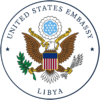
- Sponsors Type
- Federal/National
- Country
- Libyan Arab Jamahiriya
- Grant Type
- Collaboration/Cooperative Agreement
Contact Info
- Phone
- 216 71 107 000
- Fax
- 216 71 107 090
- Webmaster_Libya@state.gov
- Address
- Les Berges du Lac, Tunis, Tunisia, 1053
Last modified on 2025-06-17 00:06:05
Description
**How the United States Partners with the Government of Libya and the Libyan People**
The United States has a strategic interest in a stable and prosperous Libya, and is supporting Libya’s democratic transition in cooperation with the UN and other international partners. Recognizing Libya’s own substantial resources, the United States has focused on building Libyan institutions and increasing its capacity to govern effectively, hold free and fair elections, and manage public finances transparently and responsibly. We have also provided targeted assistance to support the development of Libyan civil society and its security forces. Investing strategically in Libya’s future will help further advance Libya’s democratic transition, promote stability, and strengthen the U.S.-Libya partnership.
Since February 2011, the United States has provided over $450 million in assistance, mostly in response to urgent humanitarian and security challenges in the immediate aftermath of the beginning of the conflict. We have also focused on supporting capacity building efforts within government institutions, developing civil society, and facilitating free and fair elections. All programs advance key U.S. interests by filling critical capacity gaps within U.S.-Libya identified transition priorities. All projects are being coordinated with the United Nations Support Mission in Libya (UNSMIL)
**History of the U.S. and Libya**
The first treaty between the United States and Tripoli was signed on June 10, 1805. Thirty years later, the Ottoman Empire reasserted itself over its Libyan provinces, and Libya was taken under Italian control until 1947. The United States recognized the United Kingdom of Libya on December 24, 1951 in a congratulatory message sent by President Harry Truman to King Idris I for declaring independence. At that time, the American Consulate General was elevated to a Legation.
The Legation in Libya was raised to Embassy status on September 25, 1954. Although relations were not formally severed, the U.S. Embassy at Tripoli closed for the first time on May 2, 1980, and the Libyan People’s Bureau in Washington closed on May 6, 1981, both until 2004. The United States established an Interests Section at the Belgian Embassy in Tripoli on February 8, 2004, transitioning into a U.S. Liaison Office on June 28. Libyan diplomats reestablished a presence in Washington on July 8, 2004, where they opened the Libyan Interests Section as part of the United Arab Emirates Embassy.
The U.S. and Libya resumed full diplomatic relations in 2006, when the Liaison Office became an Embassy. These relations deteriorated sharply when Mu’ammar al-Qadhafi attempted to suppress an uprising against his regime in 2011, leading to the United States suspending Embassy operations in Tripoli on February 25. The United States ordered the Libyan Government to suspend its Embassy operations in Washington on March 16.
The United States maintained a diplomatic presence in Benghazi from April 2011 to September 2012, appointing a Special Representative to the Transitional National Council (TNC) in March of the same year. The U.S. Government officially recognized the TNC as the legitimate government of Libya on July 15, 2011. The U.S. Embassy in Tripoli resumed operations on September 22, 2011.
The U.S. Ambassador to Libya, J. Christopher Stevens, and three other American colleagues were killed on September 11, 2012 during an attack on the U.S. Mission in Benghazi. Following the death of Ambassador Stevens, the American Embassy in Tripoli was headed by Charge Greg Hicks.
On July 26, 2014, Embassy operations in Libya were suspended due to ongoing violence between Libyan militias in the immediate vicinity of the Embassy in Tripoli. The mission was relocated to Valleta, Malta. Today, the U.S. Embassy resides in Tunis, Tunisia and is committed to continuing this relationship despite limited capacity and resources.
Sponsor Relationship
U.S. Embassy Libya is a part of:
No sponsor in our database are part of U.S. Embassy Libya.
Most Recent Grants from This Sponsors
**Funding Opportunity Number:** DOS-LEO-PD-APS-2025
**Category of Funding Activity:** Other...
Added on 2025-06-16
Deadline Approaching Grants
No grants from this sponsor have deadline within a month period.
